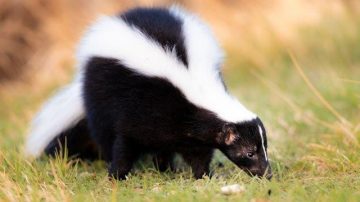FOR IMMEDIATE RELEASE

“An Electrophilic Natural Product Provides a Safe and Robust Odor Neutralization Approach to Counteract Malodorous Organosulfur Metabolites Encountered in Skunk Spray”
Journal of Natural Products
Being sprayed by a skunk is no fun for people or their pets, and the strong, stinky secretions can serve as a nasty reminder of the wildlife encounter for days or weeks. Available “de-skunking” formulas often either don’t work well or can irritate the skin and eyes. Now, researchers reporting in ACS’ Journal of Natural Products have identified a compound from fungi that safely and effectively neutralizes skunk spray odor.
When skunks feel threatened, they spray fluids from their anal glands that contain several nasty-smelling organosulfur compounds. The human nose can detect extremely low concentrations of these substances, making it difficult to completely rid clothing, hair, fur or skin of the stink. Various home and commercial remedies claim to neutralize skunk odor, but they often don’t work well or contain skin and eye irritants. Robert Cichewicz and colleagues wondered if a natural product they had previously identified from fungi, called pericosine A, could react with and neutralize odoriferous compounds in skunk spray.
To find out, the researchers mixed pericosine A with different organosulfur compounds from skunk spray and analyzed the products of the reactions. They discovered that the fungal compound reacted with two types of organosulfur compounds — thiols and thioesters — and converted them to stable, odorless products. Then, the team very slightly altered the structure of pericosine A and adjusted other ingredients in the reaction to produce a formula that would be safer and more effective for skin application than the original compound. Finally, the researchers used in vitro eye and skin tests to determine that the fungal compound was non-irritating.
The authors acknowledge funding from the University of Oklahoma.
For more on skunk smells, watch a previously posted Reactions video here.
Note: ACS does not conduct research, but publishes and publicizes peer-reviewed scientific studies.




